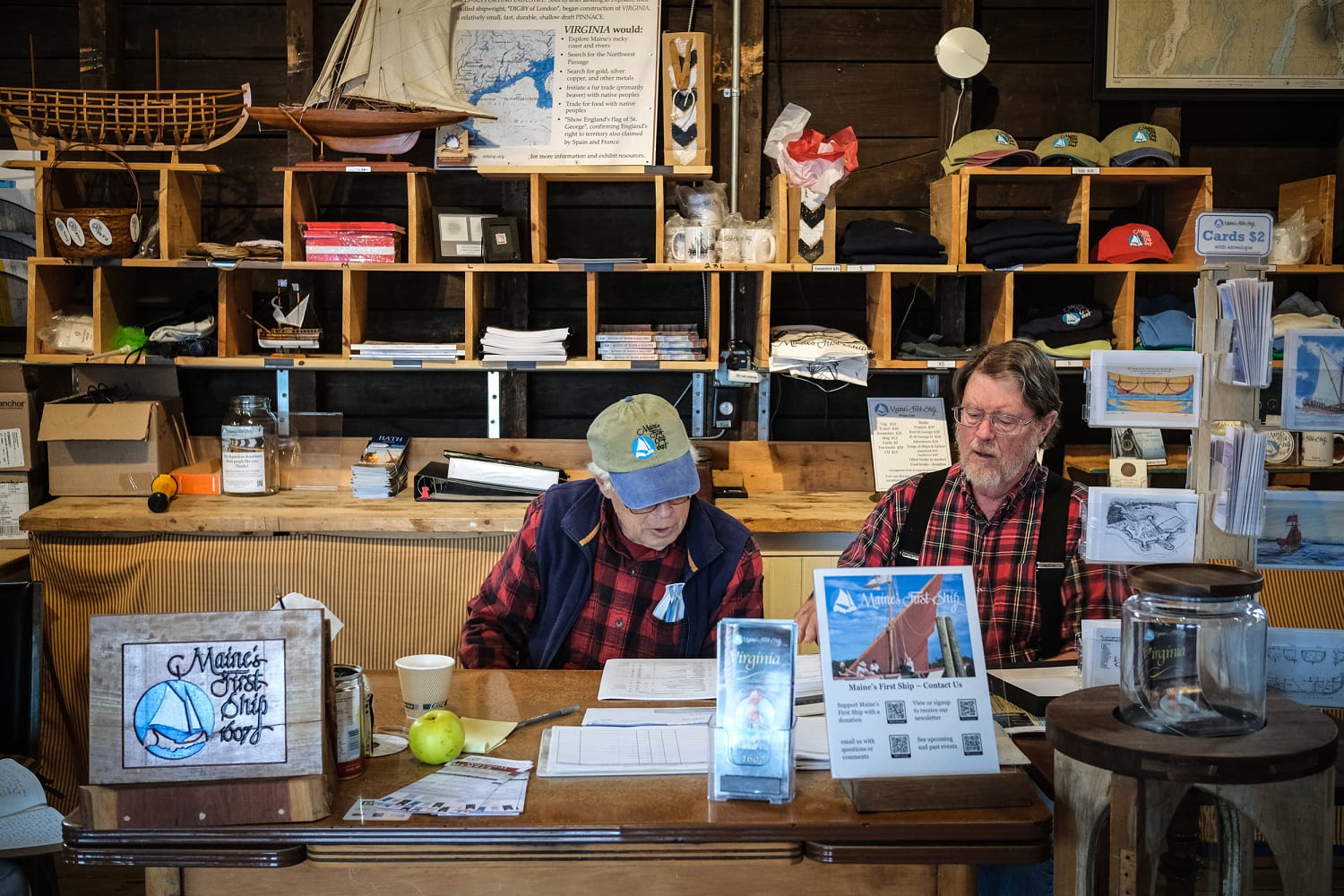

“Maine is trying really hard to be aware,” said Truluck, who described her job as sometimes having to navigate between the treacherous shoals of “tone-deafness” on one side and “performative allyship” on the other. That means including Indigenous voices in its events and lecture series and following the maxim of “nothing about us without us” in telling Native peoples’ history.
“We are in a weird business of asking Indigenous people to come stand next to us as we commemorate colonial heritage,” she said.
John Bear Mitchell, a Penobscot citizen who runs Native education programs at the University of Maine, warned an audience at Maine’s First Ship last year that the tribal history of the state “is not necessarily going to make you feel good.”
As an example, he pointed to a cash bounty colonial authorities offered in 1755 for the scalp of any Penobscot man, woman or child killed under a decree that called for “destroying all and every of the aforesaid Indians.”
The competition for the First Thanksgiving
The rejection of Maine’s Thanksgiving claim is grounded in the colony’s history and a better understanding of its negative impact on Native populations, but such concerns haven’t stopped other places from celebrating their own First Thanksgiving claims.
Plymouth, which built a tourism economy around an oversimplified narrative of the Pilgrims, hosts a large Thanksgiving parade every year, though it has more recently taken steps to highlight the fuller version of that history.
“I think almost every new generation has a new interpretation of the Thanksgiving story,” said Lea Filson, the president and CEO of See Plymouth, the local tourism board. “Where our nation is today, I think everyone is very hungry to know the entire story. And that would include the Native American story.”
What is now Berkeley Plantation, Virginia, claims it hosted the First Thanksgiving a year and 17 days before the Pilgrims even landed (yes, it is counting) and holds an annual “America’s First Thanksgiving” festival featuring both tribal dancers and colonial re-enactors.
Texas, never to be outdone, stages annual re-enactments of an even earlier “First Thanksgiving” marking a feast held on April 30, 1598, by Spanish conquistador Juan de Oñate — celebrated by some as the founder of New Mexico and reviled by others for massacring hundreds at the Ácoma Pueblo after its residents refused to give up their winter food supply.
The Texas House and Senate have both passed official resolutions declaring their state to be home to “the site of the first Thanksgiving celebration held by colonists in America.”
But Florida points to an event even earlier, in St. Augustine, on Sept. 8, 1565, when Spanish colonists celebrated a Mass of Thanksgiving with members of the Seloy tribe. There’s even a children’s book about the event called “America’s REAL First Thanksgiving.”
“The other claims for first Thanksgiving are completely truthful,” said Richard Pickering, the deputy executive director of the Plimoth Patuxet Museums. “But they are not Thanksgivings as we celebrate the national holiday.”
A thanksgiving or giving of thanks was a common religious ceremony in European Christianity during the Age of Discovery, Pickering said, performed to express gratitude for specific events, such as a good harvest or safe passage after a treacherous journey.
“What is being confused is essentially capital-T Thanksgiving and small-t thanksgivings, which are just ceremonies of giving thanks in a religious setting,” Pickering said.
The national American holiday of Thanksgiving emerged more than 200 years after any of those claims, during the entirely different historical context of the Civil War.
In 1863, President Abraham Lincoln declared the first national Thanksgiving holiday as an attempt to “heal the wounds of the nation … and to restore it as soon as may be consistent with Divine purposes.”
While Lincoln didn’t mention Plymouth, the Mayflower or Pilgrims, he was influenced by a movement for the holiday that did, led by the influential writer and magazine editor Sarah Josepha Hale of New Hampshire.
At the height of the war, Hale and Lincoln’s Thanksgiving pointed to an origin story for the U.S. rooted in staunchly pro-Union New England, not Confederate Virginia, even though Jamestown had been up and running for more than a decade before the Mayflower arrived.
Some of the Southern claimants to the First Thanksgiving have tried to reclaim that founding myth for the South.
Former President George W. Bush, a Texan, accepted an invitation to speak at Berkeley Plantation’s 2007 Thanksgiving festivities, saying he was there to “honor Berkeley’s history” even though “this version of events is not very popular up north.”
Arthur Schlesinger Jr., the historian who was John F. Kennedy’s speechwriter, confessed to an “unconquerable New England bias on the part of the White House staff” in a letter to a Virginia state senator who had written to complain about the erasure of Berkeley Plantation from the president’s Thanksgiving proclamation. Kennedy included it alongside Plymouth the following year.
A public relations masterstroke or a ‘hoax’?
Maine, too, once tried to press its claims to Thanksgiving supremacy — although historians were never really on board.
In 1964, the state Department of Economic Development staged a re-creation of what it called the “first Thanksgiving Feast by white men on American soil”; the photo and an Associated Press story about Maine’s claim to have hosted the First Thanksgiving went what we would now call viral.
The “gimmick,” as the department’s official newsletter called it, was “wisely released about the middle of November when the media were hungry for Thanksgiving Day features.” It was printed in newspapers in 40 states and featured on Johnny Carson’s “Tonight Show,” and it reached 40 million Americans, according to the newsletter, even though it cost the state nothing in advertising.
Even then, long before the modern era of “wokeness,” the local historical society denounced the photo as a grossly historically inaccurate “hoax.”
It pointed out that the photo included English women, when Popham Colony included only men, that one of the supposed Wabanaki was wearing the war bonnet of a Plains Indian from thousands of miles away and that it wasn’t even taken at the Popham Colony site, but at a nearby point deemed more aesthetically appropriate.
“I was told repeatedly that the historic facts did not matter, it was millions of dollars of publicity for the State of Maine that counted,” Ada Haggett wrote of a meeting with state officials in the newsletter of the Phippsburg Historical Society.
Still, the claim lingered among some historians and even made it into President Ronald Reagan’s Thanksgiving proclamation in 1985, when he said “the time and date of the first American thanksgiving observance may be uncertain.”
He pointed first to “a band of settlers arriving in Maine in 1607,” then to “later settlers in Virginia,” before he mentioned the famous Plymouth story.
But today, on the humble grassy patch at the end of the potholed lane where Popham Colony once stood, there is no monument, placard or Google Maps point of interest mentioning anything about Thanksgiving — there’s barely any information about the colony at all.
A spokesperson for the state agency that staged the Thanksgiving photo-op in the 1960s said last week that she “is not aware of any recent promotion of this claim or any state position on it.”
Steve Collins, a reporter for the Lewiston Sun Journal, revisited the Popham Thanksgiving for the paper in 2017 but found little interest in reviving the story. “I don’t seem to remember getting much of a reaction at all,” he said.
Last week, Orman Hines, who spent years participating in the first modern archaeological digs of the colony and helped found the nonprofit group to remember, gazed out at the shoreline where the Wabanaki canoes might have come ashore more than 400 years ago.
“There’s no Thanksgiving story here,” Hines said.

 Latest Breaking News Online News Portal
Latest Breaking News Online News Portal




